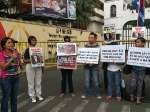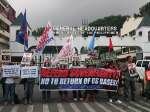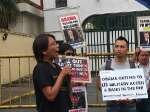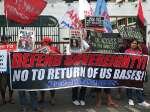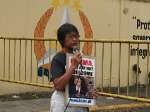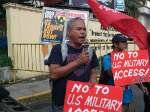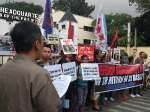 News Release
News Release
January 8, 2014
On the second month since supertyphoon Yolanda hit the country, the umbrella group Bagong Alyansang Makabayan questioned the so-called rehabilitation framework of the Aquino government called Reconstruction Assistance for Yolanda (RAY), issued by the National Economic Develpment Authority or NEDA last December 16.
“It is not just the alleged corruption in bunkhouses which should be a concern. It appears that under the government’s reconstruction framework, the poor will be marginalized even more. The so-called reconstruction framework does not address how the most affected and vulnerable sectors will recover from the devastation,” said Bayan secretary general Renato M. Reyes, Jr.
“The title of the plan is ‘build back better’ but it does not say how and when this will be done. The plan may even fall short of achieving pre-Yolanda economic levels,” he added.
Bayan observed that rebuilding the agricultural sector seems to be a low priority for the national government despite NEDA’s admission that “majority of those who lost their incomes and sources of livelihood are the marginalized rural workers – farmers, fisherfolk, and coconut farmers.”
In its study, NEDA estimates that the investment requirements for agriculture until 2017 is around P18.7 billion whereas the total damage to agriculture is around P31 billion and future losses amounting to P30.8 billion.
Bayan also questioned the emphasis on the efforts of big business in the reconstruction efforts. Rehab czar Panfilo Lacson had already announced that the reconstruction efforts will be led by the private sector with government serving as enabler or facilitator.
Under the RAY framework, “government seeks to enable new modalities to encourage and facilitate the active involvement of the private sector in implementing RAY. Options for greater private sector involvement include: expansion of public-private partnership arrangements for major investment programs.”
“The big real estate developers, mining and construction firms are lining up in disaster areas, circling like vultures on the devastated communities. They are identifying the areas that are profitable, a criteria that does not necessarily go hand in hand with the actual needs of the people. The government is pushing for greater privatization in the power sector despite the fact that this will drive power rates even higher at a time when the people have almost no income. Rather than subsidize consumers, the government will let market forces dictate the price of electricity in these disaster-stricken areas,” Reyes said.
“Because there is no coherent, government-led plan, reconstruction efforts would depend on what the private sector would view as profitable in the long-run. Storm victims run the risk of being further marginalized and exploited under such a scheme. That’s disaster capitalism for you,” he added. ###
Bayan supports the demands outlined in its Bayanihan Alay sa Sambayanan (BALSA) relief campaign. BALSA is a multisectoral effort initiated by Bayan and various progressive groups responding to calamities and disasters.
THE PEOPLE’S DEMANDS FOR POST-TYPHOON YOLANDA REHABILITATION, RECOVERY AND JUSTICE
Bayanihan Alay sa Sambayanan (BALSA)
On the Immediate Needs for Relief and Assistance
- Sustain the delivery of food and water relief to affected families, especially making sure to reach remote communities yet to be reached by government aid, until their lives and livelihood are able to stabilize;
- Ensure a faster and efficient recovery and identification of dead bodies and the subsequent provision of decent burial;
- Hasten and broaden the scope of medical and psycho-social services, with particular stress in addressing the post-traumatic stress of women and children;
- Immediately restore or provide sufficient temporary alternatives to critical public utilities such as temporary shelter, water facilities and electricity sources such as solar panels;
- Ensure the immediate transition of displaced students towards a stable environment for education through cross-registration, a waiver of school fees and the provision of their subsistent needs;
- Suspend all counter-insurgency and militarization programs in the affected areas that cause undue stress, panic and waste of resources.
On the Medium-Term Needs for Rehabilitation and Recovery
- Massively employ and mobilize affected communities in the rehabilitation and reconstruction of important public infrastructure such as housing, schools, hospitals, water systems and power systems;
- Implement a housing reconstruction plan that genuinely ensures disaster resiliency, people’s access to livelihood and social services, and due prioritization of the most vulnerable sectors;
- Provide adequate financial and material subsidy and compensation for the affected population with respect to their loss of family, property and livelihood, particularly for much-needed agricultural and fisheries support;
- Immediately conduct mangrove and beach forest reforestation, the de-siltation of rivers and other environmental rehabilitation measures deemed appropriate to affected localities;
- Ensure the training and capacity building of affected communities on disaster risk reduction and implementing locally-appropriate preparedness plans, as an alternative to the government’s top-down warning and response plans;
- Enact an itemized disaster rehabilitation and recovery fund based on a comprehensive disaster risk reduction and management plan that will act upon the abovementioned demands;
On the Strategic Needs in Addressing the Roots of the Yolanda Crisis
- Initiate a joint investigation by the United Nations Office for Disaster Risk Reduction and the UN High Commissioner for Refugees, in cooperation with local watchdogs and advocates, with the objective of holding accountable the government’s criminal neglect in preparing for and responding to the impacts Super Typhoon Yolanda;
- Implement a comprehensive and pro-active national disaster risk-reduction and management master plan that follows, and does not only pay lip service to, the goals of community-based disaster risk reduction and management, climate change adaptation and climate and social justice;
- Audit disaster and climate change-related policies such as the Climate Change Act of 2009 and its National Climate Change Action Plan (NCCAP), and the National Disaster Risk Reduction and Management Act of 2010 and the National Disaster Risk Reduction and Management Plan (NDRRMP) 2011-2028;
- Scrap destructive and pollutive policies that run diametrically opposed to climate change and disaster laws, especially those that have track records of worsening disaster and climate risks and vulnerabilities, and contributing to greater greenhouse gas emissions such as the Mining Act of 1995 and Executive Order 79, National Reclamation Plan, Fisheries Code of 1998, the Forestry Code of 1975, and the Electric Power Industry Reform Act of 2001, among others;
- Implement genuine agrarian reform under the auspices of a national industrialization program as a key solution to mass poverty and its consequent people’s vulnerability to disasters and climate change impacts;
- Abolish all forms of pork barrel justified as contingency funds, for its promotion of a reactive disaster risk reduction and management program used for corruption, malversation of funds and political patronage.

